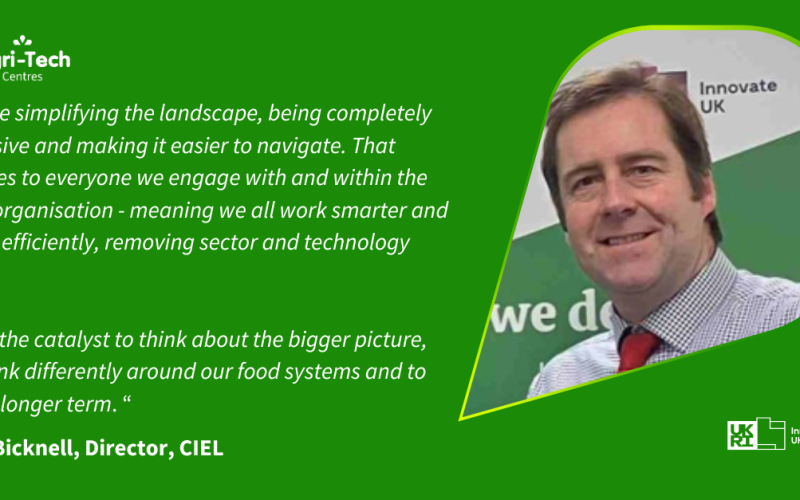By Phil Bicknell, CEO, the UK Agri-Tech Centre on challenges of the future:
In September, the three Agri-Tech Centres (Now the UK Agri-Tech Centre) were invited to develop plans to become an Agri-Tech Catapult by the Minister of State for the Department for Science, Innovation and Technology, providing recognition of the importance of innovation in the UK’s agriculture sector.
By bringing together world-class expertise, facilities and knowledge from the three Centres, CIEL, CHAP and Agri-EPI, we’ll be able to create greater cross-sector working opportunities and a systems-wide approach to the many challenges facing the food and agri industries. In essence, we will be able to deliver more, at pace and with greater impact.
We are delighted with the positive support we’ve received from the agri-food industry for this exciting plan. Since 2016, the Agri-Tech Centres have provided an ecosystem for technology to be researched, developed and tested.
Operating within the fragmented and complex agri landscape, the Agri-Tech Centres’ role has been to mitigate some of the risks associated with the research and development (R&D) phase of new technology – developing novel and transformational ideas with the long-term potential to benefit industry and society.
Each Centre has delivered multiple innovative research projects that bridge the gap between science and industry. Cumulatively they have completed or are working on over 500 projects involving more than 350 businesses – from start-ups to global corporations. These address some of the food and farming sector’s most critical challenges, such as labour availability, disease mitigation, climate change and environmental sustainability.
It’s interesting to note that when the government launched its Agri-Tech Strategy in 2013 – which led to the establishment of the Agri-Tech Centres in 2016 – some of today’s most critical R&D focuses were only just emerging as priorities. For example, avian influenza, artificial intelligence, and net zero commitments.
In addition to our project work, the Centres have also helped to redress the serious underinvestment in agricultural research and development capabilities by creating world-class facilities. This focus and investment needs to continue for the UK to remain world-class. At the same time, the UK’s agriculture regulatory and policy environment, particularly post-Brexit, is still adapting to the needs of the agri-food sector and the solutions that agri-tech can deliver.
The fast-moving demands for new technology and solutions calls for a more joined-up, systems-wide approach to innovation in the agri-sector. Acknowledging the need for a more agile and integrated approach to agri-tech will be a critical part of our planning.
As Centres, we’ve learned how best to support innovators and researchers in developing commercial products and services that are adopted by end-users and meet the needs of industry.
By bringing the Agri-Tech Centres together, and with long-term support and commitment from government, we can provide a major boost to agri-tech innovation – in a sector estimated to be worth £13bn to the UK economy by 2027. Together we can play a key role in securing the UK’s supply of food, fuel and fibres and driving collaboration across the UK innovation ecosystem to stimulate growth.
Effectively, it elevates the profile of the agri industries – forming a strategic partnership with the government. It puts food and farming on the same level as sectors like digital, energy and satellite applications, which benefit from a long-term and joined-up focus. We’ll have critical mass and a single voice. There will be no excuses for us not being on the government’s radar and vice versa.
In one step, we’re simplifying the landscape, being completely inclusive and making it easier to navigate. That applies to everyone we engage with and within the new organisation – meaning we all work smarter and more efficiently, removing sector and technology silos. It is the catalyst to think about the bigger picture, to think differently around our food systems and to think longer term.
In the meantime, we will continue to act decisively and provide trusted leadership and guidance so the agri-tech sector can effectively address critical issues and deliver sustainable long-term results that benefit people and the planet.
